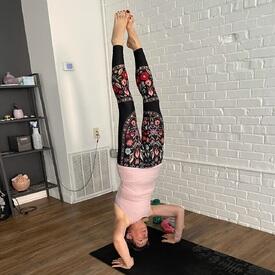Inbody weight and body composition

jkohler0377
Posts: 8 Member
I am looking for input from others who own one of these. My gym has the nicer $6000 one but I was looking at one of the smaller home models. I would love to see how my body is changing from that perspective.
0
Replies
-
I'm sure it will make a really nice doorstop.
Seriously. Don't waste your money.
They aren't accurate. AT BEST, they can show a general trend. But is a general trend worth anywhere near as much as you're considering spending?1 -
Bio impedance services are really unreliable. I think you'd be better off getting dexa scans occasionally, they also have a margin of error but not as much as InBody and similar devices.1
-
I dont want to spend a ton of money on something that isn't going to work. I am not sure where I could get a DEXA Scan for this type of reason but have heard it is an option.0
-
What's your actual goal(s) here, that leads you to consider buying this? And how much of a stretch purchase is it for you financially? Those are crucial questions.
InBody seems to have a rep as more reliable than some other BIA devices, but really most body composition "measurement" tools have pitfalls, and BIA isn't top of the heap technically IMU. ("Measurement" in quotes, because it's all estimates of varying accuracy . . . until the autopsy.)
Body composition changes tend to be slow, and not very actionable (to change rate of occurrence) IMO except that trying to lose weight faster than sensible can result in losing relatively more lean tissue vs. fat than the minimum, that not challenging current strength has some down-sides, and that under-nutrition (especially but not exclusively adequate protein) .
In using something like this, there's a strong temptation to over-focus on misleading minutia (i.e, seeming changes that are within the range of estimation error), and lose focus on what IMO matters more for long term results, i.e., sensible weight loss rate (if weight loss is needed) or gain rate (similar caveat); overall good nutrition; exercise/activity tactics that are on-point for you goals.
If you're doing all the right things for your goals to the extent practical for you, what does a change in approximate body composition add to the picture, for you? I'm seriously a data geek, track various health and fitness metrics, but I admit I'm biased about this kind of estimate: Not sure it adds much insight, honestly.
ETA: On top of the above, I've seen some posts here where folks aren't keeping percent estimates in focus.
What I mean: I've seen people concerned that their BF% hasn't changed much, in a context where their body fat has declined significantly (as measured by body weight, photos, etc.). 25% of 200 pounds is a much different amount of fat than 25% of 150 pounds - more than the percents matter. One should lose some lean mass when losing a material amount of weight, too. I think I'd look like an overfed female mosquito if I had the same blood volume now, at 2/3 of my previous body weight, y'know? 😬4 -
Here's my thoughts on it...
I lost 80ish pounds back in 2007 with no devices like fitbit or body scans. Just a digital food scale, a $25 body-weight scale and a tape measure. Honestly I didn't even use the tape measure more than three or four times. Unless you're trying to get into competitive body contests (like Jbanks256 above) I don't see the reasoning behind even caring about body fat percentage.
I know I lost a whole lot of body fat. I don't know how much and I don't care. I went from a size 22 to an 8 or 10. I look like a different person. I feel alive and healthy. I completely changed my nutrition - for the better. That matters to me.6 -
You don’t really need to get a DEXA done that often. They suggested I not come back for six months, based on my age, gender, regimen, goals. They sometimes recommend more frequently, specifically for folks doing contest prep, but they said many people get them far too often. So I go twice a year. Before the pandemic.
Google—one might be closer than you think. Or maybe on your next vacay or business trip. Or even a day trip.
As for the device you asked about. I wouldn’t waste the money.0 -
I’ve done DEXA Scans on each of my MFP anniversaries.
The first couple times, I was so fully invested, even after substantial weight loss, I lost track of the big picture, cried all the way home, and was depressed for several days.
Last year, I was down to a pretty good fat%, but was still unhappy with the results.
This year I’m up several %. No tears this time. Muscle was also up, but so was weight- a conscious decision after recognizing I’d gotten too thin.
It’s possible to become so hyper-focused on numbers, the scale, and so on, that it can become as big a problem as the weight itself.
If you’re talking like this before you even begin, you may be a candidate for fretting.
Get yourself a decent $25 home scale, a great $10 food scale, and use them. Make sure you have loved ones or trusted friends who will be honest with you, because your eyes and brain will play tricks on you. Take photos along the way. It’s easier to see results in photos than in front of the mirror.
But investing in a thousands of dollars piece of equipment to “measure” you before you even start…..lord have mercy, put that money into a gym or yoga studio membership, dance classes, a pool membership, running or walking shoes, some home gym equipment, consultations with a Registered Dietician, healthy cooking classes. Or for that kind of money, all of the above.
3
Categories
- All Categories
- 1.4M Health, Wellness and Goals
- 394.1K Introduce Yourself
- 43.9K Getting Started
- 260.4K Health and Weight Loss
- 176.1K Food and Nutrition
- 47.5K Recipes
- 232.6K Fitness and Exercise
- 437 Sleep, Mindfulness and Overall Wellness
- 6.5K Goal: Maintaining Weight
- 8.6K Goal: Gaining Weight and Body Building
- 153.1K Motivation and Support
- 8.1K Challenges
- 1.3K Debate Club
- 96.4K Chit-Chat
- 2.5K Fun and Games
- 3.9K MyFitnessPal Information
- 15 News and Announcements
- 1.2K Feature Suggestions and Ideas
- 2.7K MyFitnessPal Tech Support Questions





